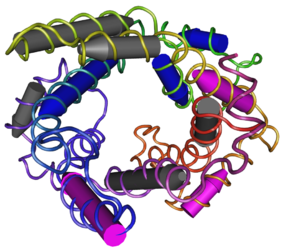Biology:UCP2
 Generic protein structure example |
Mitochondrial uncoupling protein 2 is a protein that in humans is encoded by the UCP2 gene.[1]
Mitochondrial uncoupling proteins (UCP) are members of the larger family of mitochondrial anion carrier proteins (MACP). UCPs separate, or uncouple, oxidative phosphorylation from ATP synthesis by dissipating the mitochondrial membrane potential as heat, also referred to as the mitochondrial proton leak. UCPs facilitate the transfer of anions from the inner to the outer mitochondrial membrane and the return transfer of protons from the outer to the inner mitochondrial membrane. They also reduce the mitochondrial membrane potential in mammalian cells, which reduces production of reactive oxygen species (ROS).
In contrast to UCP1 and UCP3, which are primarily expressed in adipose and smooth muscle, UCP2 is expressed on many different tissues[2] including the kidney, liver, GI tract, brain, and skeletal muscle.
The exact mechanisms of anion transfer by UCPs are not known.[3] UCPs contain the three homologous protein domains of MACPs. Although it was originally thought to play a role in non-shivering thermogenesis, obesity, diabetes and atherosclerosis, it now appears that the main function of UCP2 is the control of mitochondria-derived reactive oxygen species.[4]
Chromosomal order is 5'-UCP3-UCP2-3'.[5]

See also
References
- ↑ "UCP3: an uncoupling protein homologue expressed preferentially and abundantly in skeletal muscle and brown adipose tissue". Biochem Biophys Res Commun 235 (1): 79–82. Jul 1997. doi:10.1006/bbrc.1997.6740. PMID 9196039.
- ↑ "Tissue expression of UCP2 - Summary - The Human Protein Atlas". https://www.proteinatlas.org/ENSG00000175567-UCP2/tissue.
- ↑ Garlid, Keith D.; Jabůrek, Martin; Ježek, Petr; Vařecha, Miroslav (2000-08-15). "How do uncoupling proteins uncouple?" (in en). Biochimica et Biophysica Acta (BBA) - Bioenergetics 1459 (2–3): 383–389. doi:10.1016/S0005-2728(00)00175-4. ISSN 0005-2728. PMID 11004454.
- ↑ "Disruption of the uncoupling protein-2 gene in mice reveals a role in immunity and reactive oxygen species production". Nat. Genet. 26 (4): 435–9. December 2000. doi:10.1038/82565. PMID 11101840.
- ↑ "Entrez Gene: UCP2 uncoupling protein 2 (mitochondrial, proton carrier)". https://www.ncbi.nlm.nih.gov/sites/entrez?Db=gene&Cmd=ShowDetailView&TermToSearch=7351.
Further reading
- "The uncoupling protein homologues: UCP1, UCP2, UCP3, StUCP and AtUCP.". Biochem. J. 345 (2): 161–79. 2000. doi:10.1042/0264-6021:3450161. PMID 10620491.
- "Uncoupling protein-2: evidence for its function as a metabolic regulator.". Diabetologia 45 (2): 174–87. 2002. doi:10.1007/s00125-001-0737-x. PMID 11935148.
- Muzzin P (2002). "The uncoupling proteins.". Ann. Endocrinol. 63 (2 Pt 1): 106–10. PMID 11994670.
- "Mitochondrial uncoupling protein 2 in the central nervous system: neuromodulator and neuroprotector.". Biochem. Pharmacol. 65 (12): 1917–21. 2003. doi:10.1016/S0006-2952(03)00143-6. PMID 12787871.
- "Uncoupling protein 2: a novel player in neuroprotection.". Trends in Molecular Medicine 9 (12): 522–5. 2004. doi:10.1016/j.molmed.2003.10.009. PMID 14659466.
- "Oligo-capping: a simple method to replace the cap structure of eukaryotic mRNAs with oligoribonucleotides.". Gene 138 (1–2): 171–4. 1994. doi:10.1016/0378-1119(94)90802-8. PMID 8125298.
- "Uncoupling protein-2: a novel gene linked to obesity and hyperinsulinemia.". Nat. Genet. 15 (3): 269–72. 1997. doi:10.1038/ng0397-269. PMID 9054939.
- "Cloning and characterization of an uncoupling protein homolog: a potential molecular mediator of human thermogenesis.". Diabetes 46 (5): 900–6. 1997. doi:10.2337/diabetes.46.5.900. PMID 9133562.
- "Uncoupling protein-3: a new member of the mitochondrial carrier family with tissue-specific expression.". FEBS Lett. 408 (1): 39–42. 1997. doi:10.1016/S0014-5793(97)00384-0. PMID 9180264.
- "Construction and characterization of a full length-enriched and a 5'-end-enriched cDNA library.". Gene 200 (1–2): 149–56. 1997. doi:10.1016/S0378-1119(97)00411-3. PMID 9373149.
- "High expression of uncoupling protein 2 in foetal liver.". FEBS Lett. 425 (2): 185–90. 1998. doi:10.1016/S0014-5793(98)00230-0. PMID 9559644.
- "Structure and organization of the human uncoupling protein 2 gene and identification of a common biallelic variant in Caucasian and African-American subjects.". Diabetes 47 (4): 685–7. 1998. doi:10.2337/diabetes.47.4.685. PMID 9568704.
- "Structural organization and mutational analysis of the human uncoupling protein-2 (hUCP2) gene.". Life Sci. 64 (3): PL41–50. 1999. doi:10.1016/S0024-3205(98)00555-4. PMID 10027754.
- "Functional organization of the human uncoupling protein-2 gene, and juxtaposition to the uncoupling protein-3 gene.". Biochem. Biophys. Res. Commun. 255 (1): 40–6. 1999. doi:10.1006/bbrc.1998.0146. PMID 10082652.
- "Specific sequence of motifs of mitochondrial uncoupling proteins.". IUBMB Life 49 (1): 63–70. 2000. doi:10.1080/713803586. PMID 10772343.
- "Uncoupling proteins 2 and 3 interact with members of the 14.3.3 family.". Eur. J. Biochem. 267 (9): 2680–7. 2000. doi:10.1046/j.1432-1327.2000.01285.x. PMID 10785390.
- "A common polymorphism in the promoter of UCP2 is associated with decreased risk of obesity in middle-aged humans.". Nat. Genet. 28 (2): 178–83. 2001. doi:10.1038/88911. PMID 11381268.
- "Superoxide activates mitochondrial uncoupling proteins.". Nature 415 (6867): 96–9. 2002. doi:10.1038/415096a. PMID 11780125. Bibcode: 2002Natur.415...96E.
- "Uncoupling protein 2 and 4 expression pattern during stem cell differentiation provides new insight into their putative function". PLOS ONE 9 (2): e88474. 2014. doi:10.1371/journal.pone.0088474. PMID 24523901. Bibcode: 2014PLoSO...988474R.
- "Quantification of uncoupling protein 2 reveals its main expression in immune cells and selective up-regulation during T-cell proliferation". PLOS ONE 7 (8): e41406. 2012. doi:10.1371/journal.pone.0041406. PMID 22870219. Bibcode: 2012PLoSO...741406R.
 |
